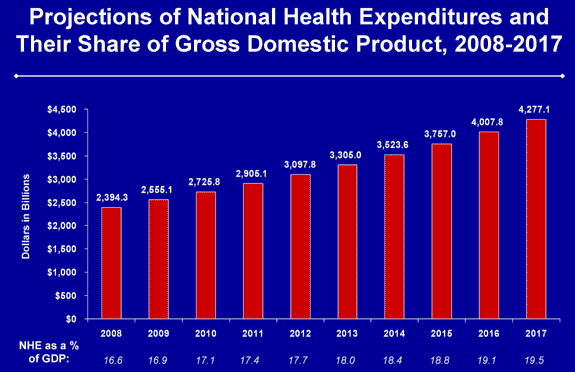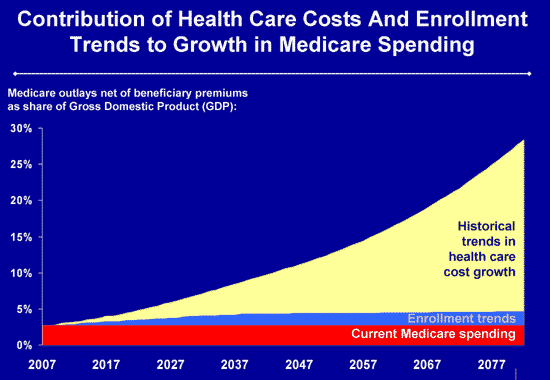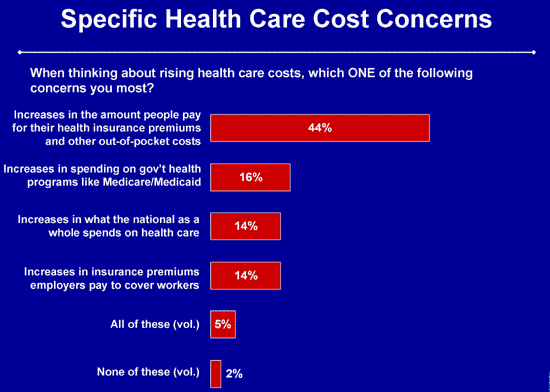Pulling it Together from Drew Altman: Multiple Agendas for Controlling Health Care Costs
In what would be a domestic policy trifecta, we may be headed for interconnected big debates about economic recovery, entitlement programs and health reform. A core issue in the entitlement and health reform debates is the problem of rising health care costs. President Obama, now apparently fully briefed on the economic, budget and health reform realities he faces, is talking conspicuously about hard choices that may lie ahead. In a short period of time the focus has shifted from the emphasis in the primaries and general election on covering the uninsured and making insurance more affordable to a new focus on hard choices, spending and costs.
As this discussion looms it may be useful to keep in mind the very different — and sometimes conflicting — definitions and agendas at play when we talk about health care costs.
For many, especially economists, reducing health care costs means reducing the share of the nation’s economy we spend on health, which is 16.6 percent now and is headed for almost 20 percent in 2017 (Figure 1). Growth in health spending has exceeded growth in the economy by about two and a half percentage points for decades, and the worry is that it will squeeze out our ability to spend on all kinds of other priorities at all levels of the economy and government if we do not reduce the rate of increase in health spending.
Figure 1

Source: Centers for Medicare and Medicaid Services, Office of the Actuary, National Health Statistics Group, at http://www.cms.hhs.gov/NationalHealthExpendData/03_NationalHealthAccountsProjected.asp#TopOfPage (see Projected; NHE Historical and projections, 1965-2017, file nhe65-17.zip).
Others — for example, deficit hawks that include many Republicans and the Blue Dog Democrats in Congress — are focused more on the impact of health costs on federal spending, the budget deficit, and government’s ability to meet its obligations. Spending on entitlement programs is the core of their concern. It almost certainly has been pointed out to President Obama that if current projections hold true, Medicare will not be able to pay all its hospital bills soon after the end of his second term. As the CBO chart below makes clear, the underlying issue behind Medicare’s projected insolvency is the broader problem of health care costs and not the aging of the baby boomer generation. Public spending for Medicaid and the tax exemption for employer-provided health insurance similarly rise with the underlying cost of health care. This bolsters the argument for linking the debate about health reform and health care cost containment with a discussion of entitlements (Figure 2).
Figure 2

SOURCE: Congressional Budget Office, The Long-Term Outlook for Health Care Spending, November 2007.
The biggest group of all, the American people, is worried about an entirely different problem and has yet again a different agenda: their own health care costs and the rising amounts they have been paying out-of-pocket for premiums, deductibles and co-pays, while at the same time being hit by multiple other economic shocks in the recession. For the worker share of the premium alone, the average amount paid by families increased from $1,543 in 1999 to $3,354 in 2008. It is this concern that has propelled health care back to the front of the national agenda and redefined it as a bread and butter economic issue of real salience for working and middle class Americans. Figure 3, from one of our recent tracking polls, makes this crystal clear. It explains why what people mostly want from health reform is for government to come to their rescue — either through subsidies or regulation or both — so that they can spend less for their health care and health insurance. People don’t really distinguish between subsidies that help to cover the cost of their insurance or cost containment efforts that mitigate the premiums themselves; they just want to pay less.
Figure 3

Source: Kaiser Health Tracking Poll: Election 2008 (conducted Oct 8-13, 2008)
Note: “Don’t know/Refused” responses not shown.
A “grand bargain” discussion about health reform and entitlements, if it develops, could create a unique opportunity to pursue all three health cost objectives together. In particular, initiatives developed as part of health reform to contain health care costs hold the promise of helping with the long-term growth of government health entitlements, though the savings may take many years to materialize. But there is also a risk that the effort will fracture over differences in goals or succeed on some objectives more than others. For example, a deal that would rein in entitlement spending over the long term, in part through promised reforms of the health delivery system, but do little to provide immediate help to the public with their health care bills, is not likely to be very popular with voters who have put health care back on the agenda precisely because of their problems paying for health care today. Of course, the steps often discussed to control entitlement spending itself, such as pushing back the age of eligibility for Medicare, income relating Medicare premiums, or reducing provider payments, have never been an easy sell with the public or the Congress, and would likely be even more difficult in the context of a severe economic recession, and deficit hawks might only buy the bargain if clear triggers for implementing them were written into the legislation.
A grand bargain discussion itself would require looking out over longer time horizons than the Congress normally does in considering the costs and potential savings from legislation; in effect trading a willingness to spend now for savings down the road that will put public programs and the federal budget on a more sustainable long term course. A discussion like this, an attempt at linking so many big issues and interests usually dealt with in Washington issue by issue, committee by committee, press story by press story, and vested interest by vested interest, would be unprecedented. It would represent an attempt not just at achieving a policy outcome, but at leapfrogging the usual policymaking process.
The problem of health care costs will be central to both the health care reform and entitlement discussions, whether they are separate or joined in a new way. It will be important to keep clearly in focus in these debates that controlling health care costs can mean very different things to a health economist or a deficit hawk or to the public; to keep the public’s agenda in mind at all times or risk jeopardizing voter support; and to make an effort to address the different agendas in health care cost containment comprehensively rather than in the usual piecemeal fashion.
